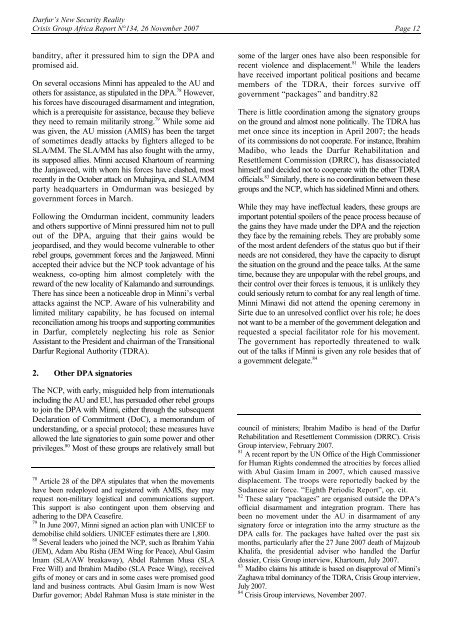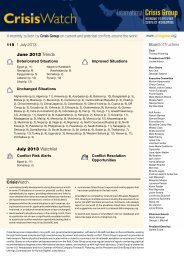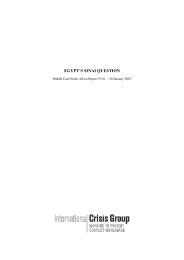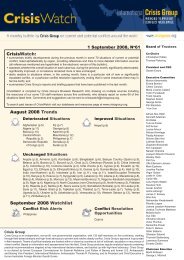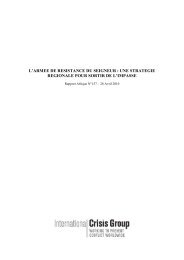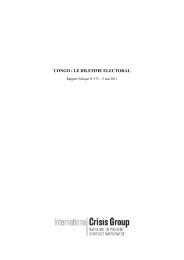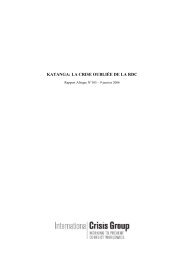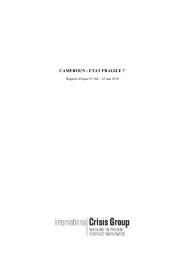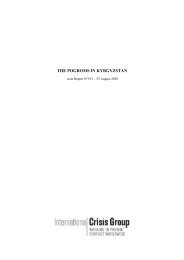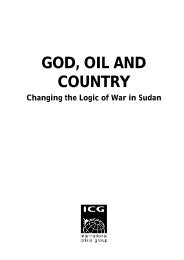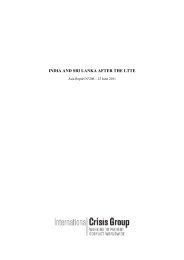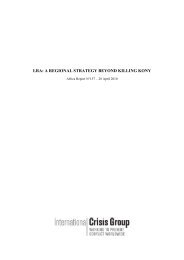sudan - International Crisis Group
sudan - International Crisis Group
sudan - International Crisis Group
Create successful ePaper yourself
Turn your PDF publications into a flip-book with our unique Google optimized e-Paper software.
Darfur’s New Security Reality<br />
<strong>Crisis</strong> <strong>Group</strong> Africa Report N°134, 26 November 2007 Page 12<br />
banditry, after it pressured him to sign the DPA and<br />
promised aid.<br />
On several occasions Minni has appealed to the AU and<br />
others for assistance, as stipulated in the DPA. 78 However,<br />
his forces have discouraged disarmament and integration,<br />
which is a prerequisite for assistance, because they believe<br />
they need to remain militarily strong. 79 While some aid<br />
was given, the AU mission (AMIS) has been the target<br />
of sometimes deadly attacks by fighters alleged to be<br />
SLA/MM. The SLA/MM has also fought with the army,<br />
its supposed allies. Minni accused Khartoum of rearming<br />
the Janjaweed, with whom his forces have clashed, most<br />
recently in the October attack on Muhajirya, and SLA/MM<br />
party headquarters in Omdurman was besieged by<br />
government forces in March.<br />
Following the Omdurman incident, community leaders<br />
and others supportive of Minni pressured him not to pull<br />
out of the DPA, arguing that their gains would be<br />
jeopardised, and they would become vulnerable to other<br />
rebel groups, government forces and the Janjaweed. Minni<br />
accepted their advice but the NCP took advantage of his<br />
weakness, co-opting him almost completely with the<br />
reward of the new locality of Kalamando and surroundings.<br />
There has since been a noticeable drop in Minni’s verbal<br />
attacks against the NCP. Aware of his vulnerability and<br />
limited military capability, he has focused on internal<br />
reconciliation among his troops and supporting communities<br />
in Darfur, completely neglecting his role as Senior<br />
Assistant to the President and chairman of the Transitional<br />
Darfur Regional Authority (TDRA).<br />
2. Other DPA signatories<br />
The NCP, with early, misguided help from internationals<br />
including the AU and EU, has persuaded other rebel groups<br />
to join the DPA with Minni, either through the subsequent<br />
Declaration of Commitment (DoC), a memorandum of<br />
understanding, or a special protocol; these measures have<br />
allowed the late signatories to gain some power and other<br />
privileges. 80 Most of these groups are relatively small but<br />
78 Article 28 of the DPA stipulates that when the movements<br />
have been redeployed and registered with AMIS, they may<br />
request non-military logistical and communications support.<br />
This support is also contingent upon them observing and<br />
adhering to the DPA Ceasefire.<br />
79 In June 2007, Minni signed an action plan with UNICEF to<br />
demobilise child soldiers. UNICEF estimates there are 1,800.<br />
80 Several leaders who joined the NCP, such as Ibrahim Yahia<br />
(JEM), Adam Abu Risha (JEM Wing for Peace), Abul Gasim<br />
Imam (SLA/AW breakaway), Abdel Rahman Musa (SLA<br />
Free Will) and Ibrahim Madibo (SLA Peace Wing), received<br />
gifts of money or cars and in some cases were promised good<br />
land and business contracts. Abul Gasim Imam is now West<br />
Darfur governor; Abdel Rahman Musa is state minister in the<br />
some of the larger ones have also been responsible for<br />
recent violence and displacement. 81 While the leaders<br />
have received important political positions and became<br />
members of the TDRA, their forces survive off<br />
government “packages” and banditry.82<br />
There is little coordination among the signatory groups<br />
on the ground and almost none politically. The TDRA has<br />
met once since its inception in April 2007; the heads<br />
of its commissions do not cooperate. For instance, Ibrahim<br />
Madibo, who leads the Darfur Rehabilitation and<br />
Resettlement Commission (DRRC), has disassociated<br />
himself and decided not to cooperate with the other TDRA<br />
officials. 83 Similarly, there is no coordination between these<br />
groups and the NCP, which has sidelined Minni and others.<br />
While they may have ineffectual leaders, these groups are<br />
important potential spoilers of the peace process because of<br />
the gains they have made under the DPA and the rejection<br />
they face by the remaining rebels. They are probably some<br />
of the most ardent defenders of the status quo but if their<br />
needs are not considered, they have the capacity to disrupt<br />
the situation on the ground and the peace talks. At the same<br />
time, because they are unpopular with the rebel groups, and<br />
their control over their forces is tenuous, it is unlikely they<br />
could seriously return to combat for any real length of time.<br />
Minni Minawi did not attend the opening ceremony in<br />
Sirte due to an unresolved conflict over his role; he does<br />
not want to be a member of the government delegation and<br />
requested a special facilitator role for his movement.<br />
The government has reportedly threatened to walk<br />
out of the talks if Minni is given any role besides that of<br />
a government delegate. 84<br />
council of ministers; Ibrahim Madibo is head of the Darfur<br />
Rehabilitation and Resettlement Commission (DRRC). <strong>Crisis</strong><br />
<strong>Group</strong> interview, February 2007.<br />
81 A recent report by the UN Office of the High Commissioner<br />
for Human Rights condemned the atrocities by forces allied<br />
with Abul Gasim Imam in 2007, which caused massive<br />
displacement. The troops were reportedly backed by the<br />
Sudanese air force. “Eighth Periodic Report”, op. cit.<br />
82 These salary “packages” are organised outside the DPA’s<br />
official disarmament and integration program. There has<br />
been no movement under the AU in disarmament of any<br />
signatory force or integration into the army structure as the<br />
DPA calls for. The packages have halted over the past six<br />
months, particularly after the 27 June 2007 death of Majzoub<br />
Khalifa, the presidential adviser who handled the Darfur<br />
dossier, <strong>Crisis</strong> <strong>Group</strong> interview, Khartoum, July 2007.<br />
83 Madibo claims his attitude is based on disapproval of Minni’s<br />
Zaghawa tribal dominancy of the TDRA, <strong>Crisis</strong> <strong>Group</strong> interview,<br />
July 2007.<br />
84 <strong>Crisis</strong> <strong>Group</strong> interviews, November 2007.


